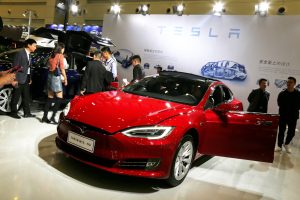Indonesia has unveiled a subsidy program to boost the domestic sales of electric vehicles (EVs), as part of its broader efforts to accelerate the adoption of EVs and attract investment from major car and battery manufacturers.
Announcing the policy on Monday, senior cabinet minister Luhut Pandjaitan and Industry Minister Agus Gumiwang Kartasasmita said that it will cover the sales of 200,000 electric motorcycles and 35,900 electric cars. It will also cover the conversion of 50,000 combustion-engine motorcycles to electric propulsion systems.
The subsidy program, which will begin on March 20, is a complement to Indonesia’s efforts to develop domestic EV production facilities to take advantage of the country’s rich reserves of nickel, a key component of the lithium-ion batteries used in EVs. President Joko Widodo has set a target of having EVs make up 20 percent of all cars by 2025. Luhut has previously expressed hopes for Indonesia to become “one of the top three countries in the world producing EV batteries as well as electric cars” by 2027.
The government did not announce the total budget allocated for the program, but stated that 7 million rupiahs (around $460) would be paid to manufacturers and retailers for each new electric motorcycle sold and each converted to electric. To be eligible, a company must make sure that the motorbike is locally made or that at least 40 percent of its components are domestically sourced.
Luhut said that the policy would make Indonesia more attractive to large EV producers, and that it was currently “finalizing negotiations with two big global car producers,” Reuters reported. “We hope this new policy will make our position much stronger than before,” he added. “If we don’t give (incentives), they will not come to us.”
Although he didn’t name any of the companies, recent reports suggest that both Chinese automaker BYD Group and U.S. EV maker Tesla are finalizing agreements to invest in domestic EV production facilities in Indonesia. Last August, Tesla signed contracts worth around $5 billion to buy materials for its batteries from nickel-processing companies in Indonesia.
The South Korean firms LG and Hyundai have started construction on plants to assemble batteries and electric cars in Indonesia, while Germany’s BASF and the French mining company Eramet are set to invest $2.6 billion in a facility to process nickel for use in EV batteries. For one thing, Tesla’s announcement last week that it would build a new factory in Mexico has raised questions about whether it still has plans to invest in a similar facility in Asia.
Indonesia’s ambitious EV plans face a lot of challenges, from the high price of EVs and the lack of charging infrastructure to international resistance to the nickel export restrictions that Indonesia has introduced to incentivize foreign investment in nickel processing. As William Yuen Yee noted in these pages last month, another thorny challenge for the Indonesian government is “balancing its desire to promote Indonesian state-owned companies while also attracting the foreign investment to make its EV dreams a reality.”
Providing that it is successful, this subsidy program represents one step on what is likely to be a very long road.
































